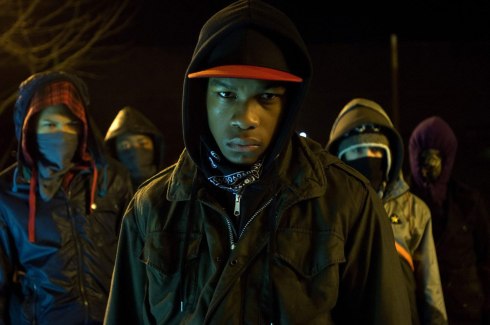 As we’ve previously covered, the 2011 sci-fi Attack the Block makes some fantastic points about racism and racial inequality. Equally as important, though, is the script’s focus on performance of masculinity. Attack the Block has a mostly male cast, and each of them starts out acting very stereotypically masculine—they curse at each other; they rob people; they use weapons; they buy, sell, and use drugs. They believe that behaving this way will naturally lead to respect and acknowledgment from their peers and from society. However, over the course of the movie, each character learns to perform masculinity in a way that’s less harmful and more responsible.
As we’ve previously covered, the 2011 sci-fi Attack the Block makes some fantastic points about racism and racial inequality. Equally as important, though, is the script’s focus on performance of masculinity. Attack the Block has a mostly male cast, and each of them starts out acting very stereotypically masculine—they curse at each other; they rob people; they use weapons; they buy, sell, and use drugs. They believe that behaving this way will naturally lead to respect and acknowledgment from their peers and from society. However, over the course of the movie, each character learns to perform masculinity in a way that’s less harmful and more responsible.
Spoilers for Attack the Block below.
Let’s start with Reginald and Gavin, or as they’d prefer to be known, Probs and Mayhem. These are two nine-year-old kids who want to be like the older boys in Moses’s group, whom they think of as delightfully grown up and dangerous. To that end, they’re constantly chasing after the boys, holding toy guns and Super Soakers, demanding that the boys call them Probs and Mayhem. None of Moses’s group thinks very much of them, and refuse to call them by their chosen monikers. Dennis wrestles the gun out of their hands and Moses tells them, “Go home. Lock your door. Do your homework. Watch Naruto. Just stay inside tonight, get me?”
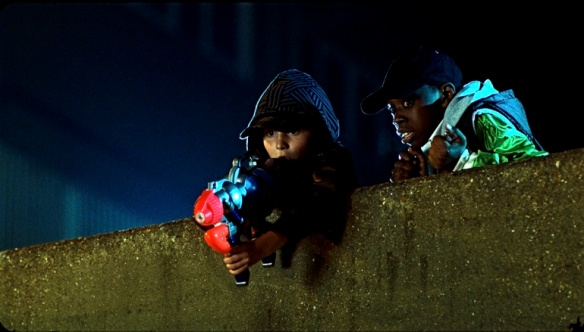 But while the rest of the group are trapped inside the Block with the aliens, Probs and Mayhem spot Biggz outside, cornered in a trash bin with an alien ready to jump him. The two of them set up their Super Soaker and a small firework and get ready to attack the alien, saying:
But while the rest of the group are trapped inside the Block with the aliens, Probs and Mayhem spot Biggz outside, cornered in a trash bin with an alien ready to jump him. The two of them set up their Super Soaker and a small firework and get ready to attack the alien, saying:
Mayhem: What if it jumps at us?
Probs: Then throw the banger.
Mayhem: What if I miss?
Probs: Then we run.
Mayhem: What if it kills us?
Probs: No one is ever gonna call you Mayhem if you keep on acting like such a pussy!
This is a fairly stereotypical understanding of masculinity—the boys believe that to be masculine, one must not be feminine (because femininity is weak). However, because of their age, it’s a fairly accurate representation of what young boys are taught: they must be tough and macho to be considered “men”. That’s why Probs and Mayhem go around with their toy weapons, hoping to shoot some aliens and be considered “manly” enough to join up with Moses’s group. But when they finally do use their weapons, it’s not in pursuit of some inaccurate masculine ideal, it’s in protection of a friend. The two of them chase the alien off, and Biggz compliments them on their excellent tactics. Then, looking carefully at each of them, he says, “Probs and Mayhem, right?” and the two little boys grin delightedly.
Then there’s Brewis, a more grown-up example—if only slightly. To summarize very quickly, Brewis is a privileged white student who’s only wandered down the Block to buy some weed. More than that, however, he’s pretty casually racist. When we’re first introduced to him, he’s listening to “Sound of Da Police” by KRS-One, a song about how Black people are unfairly apprehended by the police, and cheerfully mouthing along with no apparent trace of irony. He immediately takes the headphones out of his ears once surrounded by Moses and his group, and is too afraid to get into the elevator with them. Later on, he runs into them at Ron’s. He immediately starts trying to banter with them about the alien, as he’s taken a zoology course at university, but dulls his own message by trying too hard to use the group’s slang and terminology. At the end of his ramble, he holds out his hand for a fist bump with Dennis, but, put off by his behavior, the group shuns him.
Brewis obviously wants to be respected and accepted by a group that he thinks is “cool”, and tries to gain their respect by copying their actions. However, the group refuses to validate his efforts because it’s clear he doesn’t see Black masculinity as something that’s real; rather, he seems to think it’s merely “trendy”. Finally, when Brewis is trapped in the weed room with Moses, Pest, and Sam, he drops the act. He uses his biology knowledge to theorize that the aliens are following Moses because the first alien Moses killed was a female, and the males are coming because they’re attracted to her pheromones. “If you take those clothes off, maybe they wouldn’t know you were there—we were here,” he tells Moses. Pest protests, and Brewis says, very calmly, “I’m trying to save your life.” In direct contrast to the earlier scene, he says everything in a straightforward manner with no appropriative slang whatsoever—his accent gives away how posh he is, but this time he doesn’t care. “Bruv, I swear I will never cuss you again,” says Pest, and gives Brewis the fist bump he was looking for at the beginning of the movie. (If you read the shooting script, this moment is even more meaningful.)
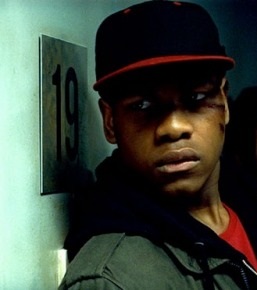 While Probs, Mayhem, and Brewis are looking to Moses’s group for validation of their masculinity, Moses himself is looking for validation from his society. He wants to both stay at the top of his group and at the same time advance the only way he knows how. When the movie begins, Moses is clearly the leader of his group, and he’s the one who first attacks Sam on the street. It’s soon revealed that he’s mugging her not only for her money, but also for the respect of his peers. When the first alien crashes into the car next to him, Moses approaches it cautiously, but the alien scratches his face and runs off. The reason Moses chases after it is not because he personally wants to kill it, but because his friends think of him as weak after he’s been attacked. Once he’s defeated the alien, he takes it back to the Block, where he talks with the group about gaining fame and fortune using the alien corpse. It’s here that a local gangster, Hi-Hatz, approaches him and tells him to sell what is presumably cocaine in order to rise up the ranks. Though Moses himself doesn’t seem too pleased about it, his friends are thrilled for him. This violent, irresponsible behavior is the accepted form of masculinity amongst his group, and by being offered the chance to sell drugs, his friends think Moses has “made it”.
While Probs, Mayhem, and Brewis are looking to Moses’s group for validation of their masculinity, Moses himself is looking for validation from his society. He wants to both stay at the top of his group and at the same time advance the only way he knows how. When the movie begins, Moses is clearly the leader of his group, and he’s the one who first attacks Sam on the street. It’s soon revealed that he’s mugging her not only for her money, but also for the respect of his peers. When the first alien crashes into the car next to him, Moses approaches it cautiously, but the alien scratches his face and runs off. The reason Moses chases after it is not because he personally wants to kill it, but because his friends think of him as weak after he’s been attacked. Once he’s defeated the alien, he takes it back to the Block, where he talks with the group about gaining fame and fortune using the alien corpse. It’s here that a local gangster, Hi-Hatz, approaches him and tells him to sell what is presumably cocaine in order to rise up the ranks. Though Moses himself doesn’t seem too pleased about it, his friends are thrilled for him. This violent, irresponsible behavior is the accepted form of masculinity amongst his group, and by being offered the chance to sell drugs, his friends think Moses has “made it”.
Moses, more than any other example here, is the one who’s painfully taught the error of his ways. It’s because he mugged Sam that the police come after him and his group. It’s because he killed the alien and brought it to the Block that the aliens are after him. And it’s because the aliens are after him that his friends start to die. When Moses sees what’s happened, he’s ashamed. He says:
Wish I’d never chased after that thing. Wish we never murked you [Sam]. Wish I’d never took white off Hi-Hatz. Wish I’d just gone home and played FIFA like Biggz said.
However, the realization that his behavior has been morally reprehensible doesn’t stop him from the further realization that a true leader is responsible for his actions. Before he goes on his Hail Mary run to blow up the aliens, he says, “I killed that thing. I brought them in the Block. I’ve gotta finish what I started.” In the end he does act responsibly—he risks his own life to save the Block. As he’s being led to the police van under wrongful charges, the people of the Block start cheering and chanting his name. “You hear that, bruv?” says Pest. “That’s for you.” Moses’s society has recognized, validated, and celebrated his existence. Though he’s being arrested as a criminal, the people of the Block, even the ones who called him a monster at the beginning of the movie, know that he’s really a hero. As we’ve watched the movie, we’ve seen Moses change his actions. He knows what his friends consider masculine and what his local authority figures (Hi-Hatz) consider masculine, and he’s chosen to perform masculinity in a more beneficial, morally responsible manner.
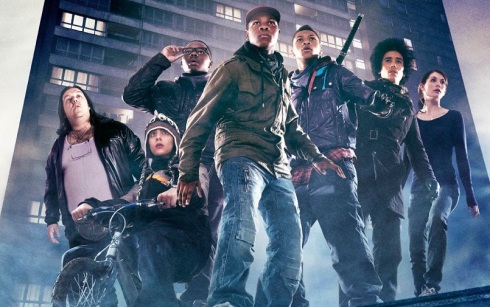 While race and class certainly play a role in the construction of masculinity, I don’t necessarily have the position to analyze Black masculinity (being neither male nor Black). That being said, it’s important to note that in Attack the Block, the construction of Black masculinity is very much a result of the class and environment in which these kids are growing up. The “trendy” Black masculinity that Brewis is originally chasing after is a lie. What he sees as Black behavior is what he thinks of as the “correct” way to perform masculinity—when he first meets the group, each one of them is carrying a weapon, cursing, using drugs. The upper-class Brewis tries to pull on the culture of the Block like a jacket, acting “tough”, without realizing that his performance of masculinity is inherently privileged over the Black kids from whom he stole it. When Brewis tries to act like Moses at the beginning of the movie, nothing happens to him. When Moses tries to act like Hi-Hatz, he immediately gets run down and arrested by the police. The responses to Black men’s performance of masculinity will always be different than the responses to white men’s performance of masculinity. Yet another bit of racial inequality to add to Attack the Block’s already sizable commentary.
While race and class certainly play a role in the construction of masculinity, I don’t necessarily have the position to analyze Black masculinity (being neither male nor Black). That being said, it’s important to note that in Attack the Block, the construction of Black masculinity is very much a result of the class and environment in which these kids are growing up. The “trendy” Black masculinity that Brewis is originally chasing after is a lie. What he sees as Black behavior is what he thinks of as the “correct” way to perform masculinity—when he first meets the group, each one of them is carrying a weapon, cursing, using drugs. The upper-class Brewis tries to pull on the culture of the Block like a jacket, acting “tough”, without realizing that his performance of masculinity is inherently privileged over the Black kids from whom he stole it. When Brewis tries to act like Moses at the beginning of the movie, nothing happens to him. When Moses tries to act like Hi-Hatz, he immediately gets run down and arrested by the police. The responses to Black men’s performance of masculinity will always be different than the responses to white men’s performance of masculinity. Yet another bit of racial inequality to add to Attack the Block’s already sizable commentary.
Attack the Block shows through each of these characters that masculinity is a performance, and it doesn’t have to be an inherently violent, amoral one. Indeed, each character mentioned here gets what he is looking for when he changes his performance to be less harmful. When they act to save Biggz, Probs and Mayhem are acknowledged by the older kids. When Brewis realizes that he isn’t really Black and stops acting like he is, Moses’s group accepts him. And when Moses rejects Hi-Hatz and his friends’ idea of masculinity and saves the Block, the residents of the Block stop treating him disdainfully and start to respect him. Those who watch Attack the Block might come for the alien invasion, but hopefully they’ll stay for the film’s great messages about race, class, and masculinity.
Follow Lady Geek Girl and Friends on Twitter, Tumblr, and Facebook!

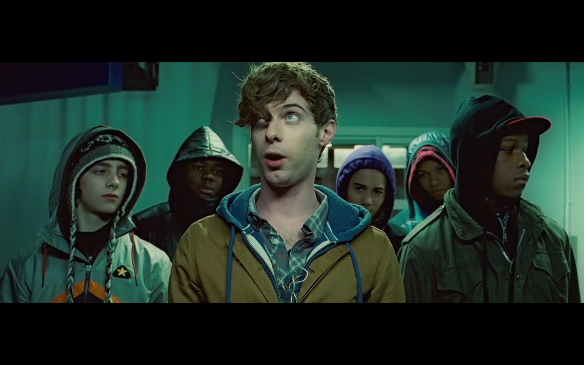
Pingback: Fanfiction Fridays: A Flag That Bears the Name by Chash | Lady Geek Girl and Friends
Wow. A great reading of the film.
Thanks! Glad you enjoyed it!
Pingback: Attack the Block (2011) | Jack Mackenzie: Writer